Build it and they will come…to tell you that you haven't jumped through the bureaucratic hoops December 26, 2008 - If Haywood County, NC planners review Verizon Wireless' application to extend their Mauney Cove cell tower 20-feet, there will be no need to ask for an artist's rendering of what the visual impact will look like.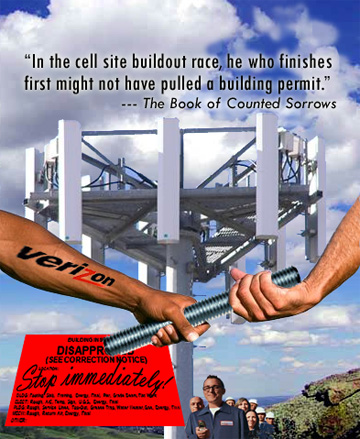
Commissioners can easily drive by the site and see how it will look since Crown Castle International has already extended the structure without applying for a building permit, according to County Planner Kris Boyd.
County commissioners learned of the erection error at their meeting last week. The illegal construction was discovered when neighbors around the tower were recently notified that there would be a public hearing to increase the tower's height. They called Boyd and asked why he would have a hearing for work that had already been done.
In addition to a permit, the construction requires an exemption from the county's cell tower ordinance. The additional 20 feet added to the tower exceeds the ordinance's fall zone requirement by six feet.
Verizon is expected to provide the county with engineering that will identify a break point design that would recognize that if the structure were to collapse it would not fall into neighboring properties. Please see: Canopy growth required retrofit
|
National Park Service will take over California mountaintop tower leases, possibly remove sites
December 16, 2008 - We're from the government, we're here to help you with your tower lease, almost two-dozen tenants will be told before Christmas as they mull over their readjusted rents for tower space on Shasta Bally Mountain in California.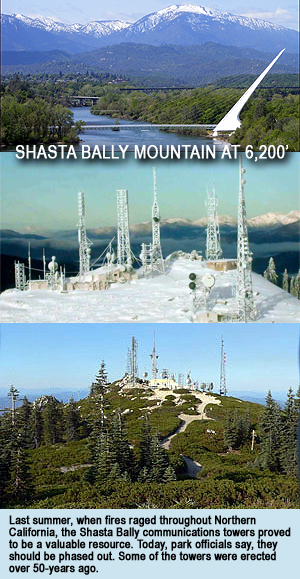
Whereas most landlords, especially during an economic downturn, will curry up to their renters, the National Park Service has inferred that they would not care if their unsightly tenants vacated their property.
Earlier this year California Oregon Broadcasting Inc. won its suit against the National Park Service to renew its 50-year-lease atop the 6,200-foot summit, but the Park Service is determined to phase out commercial and emergency service tower operations on the Northern California peak.
COBI, the parent company of NBC television affiliate KOBI, fought a legal battle in 2006 to renew its lease for another 50 years. The towers were erected in an era when the land was leased from private landowners. The federal government obtained the land in 1965 and COBI's lease expired in 2006. But the communications company had the right to renew the lease for another 50 years.
COBI had notified the National Park Service that it intended to renew the lease for an additional 50 years and provided their proposed rental. NPS responded that the terms 'first right' meant that COBI only had a right of first refusal and that NPS would lease the property to COBI or others.
COBI then sued the NPS for breach of the lease and requested $1 million dollars in damages. The court found that COBI was given an option to renew the lease for
50 years. In their summary judgment ruling, the US Court of Federal Claims also rejected the government's arguments that the damages were not speculative or unforeseeable.
However, as part of the court settlement, all of COBI's tower clients will become tenants of the federal government on August 30, 2009. The government is also restructuring rents. If they are not acceptable to the tenants they can request arbitration.
COBI's first lease had allowed the company to establish subleases for telecommunication towers and microwave repeaters on the summit of Shasta Bally Mountain.
The mountaintop site includes eight buildings, 10 towers and two diesel fuel tanks. It has about twenty two tenants, ranging from television and radio stations to telephone companies.
The Park Service has argued the road leading to the mountaintop is too expensive to maintain.
A few dozen people, including television and radio station managers, sheriff's and police officials, and representatives of elected leaders, attended a meeting at Redding City Hall last Thursday during which Whiskeytown National Recreation Area staff outlined possibilities for the future of the 6,200-foot mountaintop.
Park service officials said that they want to make it look more pristine, by phasing out its cluster of communication towers during the next 10 to 15 years or stealthing the towers so they won't be such an eyesore.
The towers' tenants could "make them all look like trees," said Jim Milestone, Whiskeytown's superintendent.
|
Wisconsin bird hunter arrested after firing upon Alltel cell tower in Barron County
December 15, 2008 - Grouse, pheasant, rabbit and fox are permissible hunting game this time of year in Wisconsin. Pigtails, coaxial cable and lighting systems are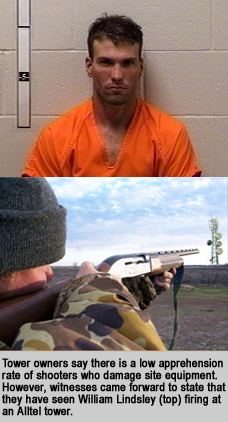 not allowable kills a Barron County man found out after residents turned him in to authorities for shooting equipment and birds on a cell site tower. not allowable kills a Barron County man found out after residents turned him in to authorities for shooting equipment and birds on a cell site tower.
William Lindsley of Cumberland has been charged with criminal damage to property. The criminal complaint says witnesses told police they've seen Lindsley aim at birds and at the red lights on an Alltel cell phone tower near his home.
Alltel estimates the damage done to the tower is nearly $45,000.
Investigators took nine firearms from Lindsley's home.
The misdemeanor charge has a maximum penalty of nine months in jail and a $10,000 fine.
Tower owners frequently have to make repairs to sites caused by rifle or shotgun damage.
In the past two months a Center Point, IN guyed tower's lights have been shot out multiple times, according to Clay County Sheriff Mike Heaton.
"This is our communication tower, if something happens to it. It doesn't just effect the sheriff's department, it effects the fire department, e-m-s the emergency services here in the county, if something were to happen to that tower," Heaton said.
Coaxial cable is somewhat resilient to small penetrations; however, air lines will require immediate attention when they are breached.
Over the years, a number of reports throughout the country have stated that tower technicians have been fired upon while working on a structure.
|
NATE applauds Washington broadcast, calls for industry to staunch climber fatalities
December 10, 2008 - The National Association of Tower Erectors has congratulated the NBC Seattle, WA affiliate, KING5 for their recent in-depth broadcast on the tower industry (Part 1) (Part 2). The piece, which aired following the death of two tower climbers in the Washington state area, draws attention to some of the largest obstacles that must be overcome by the tower, cellular and broadcast industries to ensure that all tower climbers go home safely at the end of the day. Washington state area, draws attention to some of the largest obstacles that must be overcome by the tower, cellular and broadcast industries to ensure that all tower climbers go home safely at the end of the day.
"Additional action is needed to help save lives," said Don Doty, chairman of the NATE board of directors. "That's why NATE launched a campaign to bring tower owners and operators, including cellular, wireless and broadcast organizations together and request that they join us to make substantive changes in the way the industry operates."
NATE is asking tower owners, broadcasters, carriers and general contractors to work with the association to develop solutions to outdated policies and procedures affecting the industry and:
—Ensure that only qualified contractors that provide proper training and equipment to  do the job safely are hired to work on towers, on the ground and aloft. do the job safely are hired to work on towers, on the ground and aloft.
—Set reasonable deadlines and budgets to complete jobs that are realistic or flexible to ensure that companies working on the tower can complete the work safely and keep their crews working inside safe limits.
The KING5 broadcast highlighted these issues specifically in an interview with John Breckenridge, owner of Seacomm Erectors near Monroe, which works mostly on large TV and radio towers across the country.
In the broadcast, Breckenridge, who has steered his business away from cell tower contracts, due to high pressure from cell companies and low experience from competing bidders, states that the cellular industry "was just crazy. They wanted us to do so many, so fast, for so cheap. They slam 40 sites on you and want them done in two months. If you don't get done you don't get paid."
Doty says that he sees this trend happening all too frequently across the industry and NATE is calling for change.
"We are urging cellular, wireless and broadcast organizations to team with our association to make the changes necessary in the industry," said Doty. "Change cannot happen from a single source, we all have to work together to ensure that safety is the only way of conducting business in this industry."
One inaccuracy mentioned in the report, Doty pointed out, is that Washington state tower climbers are not required to tie-off.
"Free climbing, or climbing without being tied-off using appropriate safety equipment, is illegal in all states. Whether or not the state rules cover this explicitly, a state cannot have regulations that provide less safety than those provided by the federal government. NATE works constantly to communicate to members about the importance of safety and serve as a constant reminder for the importance of tying-off 100% of the time," Doty said.
|
Foundation crew rescued from remote tower site after becoming stranded by Kodiak storm
December 9, 2008 - Used to severe weather conditions, four telecommunications workers were dropped off Sunday on top of a 2,800-foot mountain near Kodiak, Alaska to pour a microwave tower foundation. The project was expected to take four days, but will likely be extended to the spring.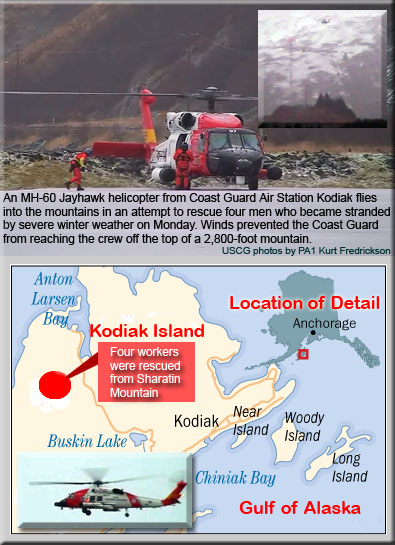
The Coast Guard said four employees of the Kodiak Kenai Cable Co. were brought in by a private helicopter, but were forced to call to be rescued after a winter storm blew away their campsite, leaving some of them with frostbite and hypothermia symptons.
High winds blew away one of the crew's tents, and storm conditions caused three of the workers to became separated from their fourth crew member and they holed up in a snow cave, said Coast Guard petty officer Wes Shinn.
The three telecom workers were able to contact the Coast Guard via VHF radio at 7:45 a.m. The one man who had remained in another tent at the camp called on his satellite phone at 5 a.m., also requesting a rescue.
Hampered by the storm, the Kodiak Island Search and Rescue team reached the workers 12 hours later after they flew up part of the way and walked the rest.
The storm battered the mountain with 50 mph winds, below freezing temperatures and heavy snowfall, said the Coast Guard and National Weather Service.
The rescuers supplied the men with clothing, water and food, said Coast Guard chief Stephen Harrison. They were required to hike down the mountain in the dark.
"Taking supplies for a week, having two methods of communication and the training to build a shelter made all the difference for these individuals," said Lt. LuAnn Kehlenbach, Coast Guard Sector Anchorage command center chief. "Even the most prepared and experienced individuals can run into trouble."
The tower site is on Sharatin Mountain, popular among Kodiak hikers who plan on taking about three hours to get to the top in better weather.
The Kodiak Kenai Cable Co. is building the microwave tower as part of a $2.5 million project to bring high-speed Internet and cell phones to Kodiak's remote villages. The Sharatin tower site was the first of about a dozen to be built.
|
It's dead for now, but FCC says it will continue its fight for backup-power regulations for cell towers
December 4, 2008 - The Federal Communications Commission said yesterday that its attempt to require backup power for all U.S. cell phone towers is presently not an immediate concern for tower owners, but the agency will be revisiting the issue soon.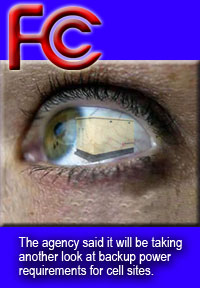
The agency told a federal appeals court in Washington, D.C., that it will honor the Office of Management and Budget's decision rejecting its proposed requirement.
FCC attorney Nandan Joshi said in a letter to the court that the agency would not override the OMB's ruling.
Joshi said, the FCC would begin working on a new set of backup-power regulations "that will ensure that reliable communications are available to public safety during, and in the aftermath, of natural disasters and other catastrophic events while at the same time attempting to address concerns that were raised regarding the prior rules."
He also asked that the U.S. Court of Appeals for the District of Columbia Circuit dismiss the legal challenge to the regulations, saying that because of the OMB's decision, the issue was moot.
Responding to yesterday's development, Overland Park, KS-based Sprint said in a statement, "Providing reliable communications services during emergencies is key to what Sprint offers it consumers, and to that end, we await the FCC's new proposal on this important issue and plan to participate in this proceeding."
|
Federal regulators reject FCC's proposed cell tower eight hour backup rules
December 2, 2008 - Federal regulators have rejected proposed changes by the Federal Communications Commission that would require all U.S. cell phone towers to have at least eight hours of backup power. 
The Office of Management and Budget said late Friday that the FCC transgressed the Paperwork Reduction Act by, among other things, not seeking public comment and evaluating feedback on information collection guidelines included in the 2007 backup-power decision.
The OMB also said the FCC failed to justify the practical utility of the information collection obligations.
The U.S. Court of Appeals for the District of Columbia Circuit put the FCC's backup-power ruling on hold in February. In July, following oral arguments in May that did not appear to go well for the commission, the court said it would hand down a decision after OMB completed its review.
The court will decide whether the FCC exceeded its authority in mandating the backup-power rule.
"We believe that having backup power for America's communications networks during times of emergency is vitally important for public safety," said FCC spokesman Robert Kenny. "Ensuring that reliable and redundant communications are available to public safety during, and in the aftermath, of natural disasters and other catastrophic events continues to be a high priority for the commission. We are considering our options in light of the OMB decision."
Since the U.S. Court of Appeals has not ruled yet, the wireless industry cautiously applauded OMB's ruling.
"CTIA is pleased the Office of Management and Budget recognized that the FCC failed to seek and evaluate public comment on these important rules at the inception of the rulemaking process, and failed to demonstrate the practical utility of the information collected," stated the cellular industry association.
"While we have the same goal as the FCC - to keep our networks running during times of emergency - we believe that having the flexibility to adapt to unique emergency situations will better serve American wireless consumers. Carriers already have implemented flexible business continuity/disaster recovery plans that address their backup power needs and enhance network reliability and resiliency."
OMB's action is not binding on the FCC, which could override it, modify existing requirements, or choose to do nothing and forego the rule.
The FCC estimated each wireless carrier would have to expend approximately $312,600 to comply with backup-power information collection requirements, but the mobile-phone and tower industries told OMB that figure is way too low to meet the federal mandate.
Crystal Davis, a spokeswoman for Overland Park, Kan.-based Sprint, said the company was "pleased" that the OMB found that the reporting requirements would have been an "undue burden" for cell phone carriers.
|
One TV airing tackles the lack of climber safety, another focuses upon a professional installation
December 1, 2008 - The tower construction and maintenance industry was the focus last week of an investigative piece by a Washington TV station and a National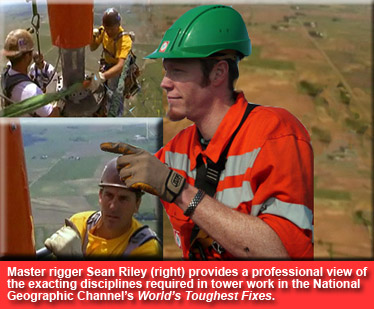 Geographic Channel special on the replacement of a broadcast antenna. Geographic Channel special on the replacement of a broadcast antenna.
NBC affiliate King 5's Chris Ingalls provided a two-part (Part 1) (Part 2) newscast on the two deaths of tower workers within less than two months in Ellensburg and Port Angeles.
Ingalls' report said that one of the workers may have been drinking prior to his fall. He also noted that Washington's safety officials were going to increase their inspections and promulgate new tower industry laws as well as add more inspectors.
A National Geographic Channel special on broadcast tower workers, to be aired again on December 3 at 6:00 p.m. EST, provided a professional look of a broadcast tower crew on World's Toughest Fixes.
Host and master rigger Sean Riley guided viewers through a one-hour special as Tower King ll of Dallas, TX replaced a faulty TV antenna on a 2,000-foot tower in Rowena, SD.
Special rigging was required for KDLT's 7,000-pound antenna. A preview can be seen here.
Riley is an expert in heavy duty rigging and load bearing, and works with specialized engineers to tackle these uniquely difficult jobs. An American reality series, World's Toughest Fixes premiered in September.
Tower King ll is well-known throughout the country for their specialization in tall tower work. The company was featured by WirelessEstimator.com in a real-time construction project of a 1,500-foot guyed tower near Deland, FL.
|
Tucson technician dies following 65-foot fall
November 18, 2008 - Updated November 19, 2008 - A 22-year-old tower technician working approximately 65 feet up on a tower fell to the ground today while adding equipment to the tower, said Todd Cupell, spokesman for the Corona de Tucson Fire Department in Arizona.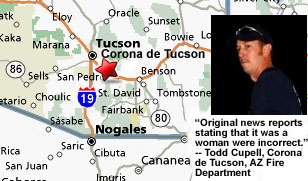
Cupell said the man was unconscious and unresponsive, but alive and in critical condition when he was taken by helicopter to a local hospital.
However, a spokesperson for the Pima County Sheriff's Department said that Edward Wallen had died from his injuries.
Cupell said that original reports that the worker was a woman were incorrect.
The tower is located at 16336 S. Houghton Road, about a half mile south of Houghton and Sahuarita roads. The emergency call came in at 12:31 p.m., according to authorities.
The tech was working with another employee of Wallen Communications, based out of Tucson and Phoenix. Established in 2001, the company specializes in cell site construction and broadcast microwave installation.
"I don't know for sure whether it was operator error or if it was the equipment he was using," Cupell said.
Cupell said the structure is a self supporting tower that had been built and remained vacant for a couple of years, but had recently seen tenant activity. He was unaware of the tower's current owner.
The FCC's database does not identify a registered structure at 16336 S. Houghton Road, but shows an 82-foot structure for Alltel Communications at 16355 S. Houghton Road.
|
An unsexy Choker's Gone Wild and another 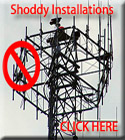 Climbers Hall of Shame introduced Climbers Hall of Shame introduced
November 18, 2008 - A safety professional recently looked up and saw a technician hanging from a T-Arm mount.
Upon closer examination, it was obvious that the tower climber was tempting fate and has been added to WirelessEstimator.com's Hall of Fame, a distinction that will not be accented on his company's portfolio of safety achievements. 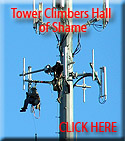
At the same time, an industry professional identified a mounting frame where the installer decided that the shear strength of canvas surely wasn't something to be concerned about.
If you see other unsafe working practices or innovative and/or unsafe installation procedures, please forward them to info@wirelessestimator.com. |
San Francisco FCC field office is letting owners know about their attitude on latitude and longitude
November 12, 2008 - In an effort to ensure that towers are locked into their Federal footprint, the FCC visited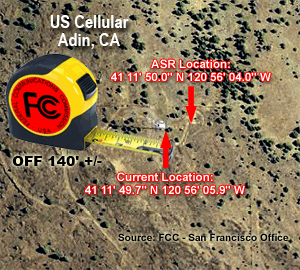 Susanville, CA, home of the High Desert State Prison and the California Correctional Center, and found that a country and western station's tower was in violation of its registered location. Susanville, CA, home of the High Desert State Prison and the California Correctional Center, and found that a country and western station's tower was in violation of its registered location.
For 10 years the 310' guyed tower has been living a lie, say FCC investigators who recently discovered the structure was 600' from its originally filed latitude and longitude, a location that is next to State Road 36 and might compromise traffic.
In October, the FCC issued the tower's owner, Rodney P. Chambers d/b/a Sierra Broadcasting Corporation, a Notice of Violation requiring him to explain the breach and provide a statement of the specific action taken to correct the violation and preclude its recurrence.
Whereas the FCC's Field Issued Citations, Notices of Apparent Liability and Notices of Violation typically cover lighting, painting, studio, unlicensed operation, RF, licensing and other issues, it is rare to see investigators specifically targeting a structure's location.
However, in addition to Susanville, one of San Francisco's agents visited another site during the same week in August and after trekking to rural Adin with a population of 600 people, he found another wandering guyed tower.
Registrant United States Cellular Corporation was also issued a Notice of Violation on October 10.
There are no written guidelines for field agents as to what constitutes a tower site that is not within provided coordinates. Nor is there a procedure for how the investigator will survey the site to be able to capture an accurate location.
In the US Cellular NOV, the agent said he observed the actual location of the structure to be "approximately" 140-feet from its registered location.
US Cellular's 215' guyed tower was built in 1995.
|
Ice overload topples North Dakota 300' tower
November 12, 2008 - Morton County North Dakota's emergency manager says Great Plains Towers is on site working to replace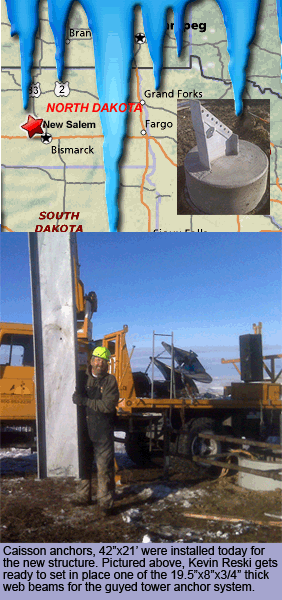 their communications tower that collapsed in rain and blizzard conditions on Thursday. their communications tower that collapsed in rain and blizzard conditions on Thursday.
The heavy ice loading reportedly toppled the structure.
Emergency Manager Tammy Lapp-Harris said the 300-foot guyed tower collapsed late Thursday afternoon, about three miles south of New Salem, and fell in four pieces.
She said some of it fell across power lines.
Lapp-Harris said emergency communications for some parts of the county were interrupted for up to 48 hours.
She said a portable tower was brought in as a temporary replacement.
"We got in a portable tower from Verizon Wireless out of Alexandria, Minn. They brought that up Friday night and had it up Saturday and got the equipment switched over," Harris said.
According to Kevin Reski, President of Great Plains Towers, the butt welded flanges of the 24" solid rod tower pulled through the weld and fell in 40-foot lengths.
Officials estimate it will cost about $66,000 to replace and install a new tower.
Antennas and transmission lines for the new structure are not included in their estimate. Click here for additional photographs.
|
Could face up to 30 years in prison
Arrested former field superintendent being investigated for additional copper thefts
November 5, 2008 - A former Florida field superintendent and his associate were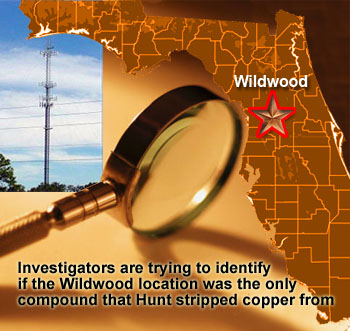 arrested for stealing copper from a Metro PCS cell site on October 25. The carrier hopes this might end a rash of copper thefts plaguing the Orlando market. arrested for stealing copper from a Metro PCS cell site on October 25. The carrier hopes this might end a rash of copper thefts plaguing the Orlando market.
Both men could be the first people to be tried under Florida's new law to combat copper theft that makes it a first degree felony.
Detective John Marshall of the Sumter County Sheriff's office said that Jared Hunt and Alex Riairas were arrested by Sheriff's Deputy Jason Adkison as the men were leaving a cell site in Wildwood with copper that they had stripped from Metro PCS's equipment early Saturday morning.
Please see: Hunt claims it was his only theft
|
FCC approval pushes Verizon/Alltel to No. 1
November 5, 2008 - The Federal Communications Commission yesterday conditionally approved the Verizon Wireless-Alltel Communications L.L.C. and the Sprint Nextel-Clearwire Corp. mergers.
The FCC extended roaming obligations in the $28 billion Verizon Wireless-Alltel deal from two to four years. Small, rural and regional wireless carriers sought a seven-year roaming condition, and they have sought other rules to strengthen roaming.
The combination of Verizon Wireless and Alltel will put the carrier ahead of AT&T Mobility as the nation's No. 1 wireless provider.
|

|
|